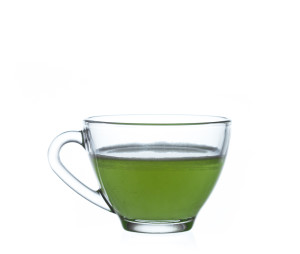Written by Greg Arnold, DC, CSCS. Participating healthy subjects who drank 200 mg of L-theanine had significantly decreased cortisol levels 3 hours later, which validates the anti- stress effects of L-theanine.
 Green tea’s numerous health benefits are attributed in part to high levels of antioxidants, specifically EGCG (1). But another component that produces health benefits, particularly mental health benefits, is an amino acid called L-theanine (2). A single cup of green tea contains around 25 mg of L-theanine (3), which crosses the blood brain barrier (4) and has been shown to increase levels of serotonin, a “feel good” nerve chemical (5), in the brain (6).
Green tea’s numerous health benefits are attributed in part to high levels of antioxidants, specifically EGCG (1). But another component that produces health benefits, particularly mental health benefits, is an amino acid called L-theanine (2). A single cup of green tea contains around 25 mg of L-theanine (3), which crosses the blood brain barrier (4) and has been shown to increase levels of serotonin, a “feel good” nerve chemical (5), in the brain (6).
Most research on L-theanine, however, has been done with it in combination with other tea ingredients, including caffeine (7, 8). Research has started to isolate L-theanine from those other tea ingredients and is continuing to find mental health benefits. A 2016 study (9) involved 34 healthy subjects (15 men, 19 women) aged 21 to 31. They consumed 14.5 ounces of a sweetened drink containing 200 milligrams of L-theanine per day or a placebo. At 1 and 3 hours after consumption, saliva samples were obtained to measure cortisol levels while a subset of 17 subjects (8 men, 9 women) underwent a magnetoencephalography to measure alpha brain waves, which can be considered “a crude indicator of an individual’s state of stress, anxiety or relaxation” (10). In addition, the subjects completed a multi-tasking framework activity to measure their stress and cognitive performance (11).
The following changes were noted by the researchers:
- Cortisol levels significantly decreased by 0.35 millimoles/Liter compared to a 0.75 mmol/L increase in the placebo group (p < 0.05). No before/after data was provided and no statistical significance was reached 1 hour after consumption).
- Those in the L-theanine group had a 13.73-point drop in the multi-tasking framework activity compared to a 1.58-point increase in the placebo group at 1 hour (p < 0.01). Statistical significance wasn’t reached at 3 hours (p > 0.05)
- Regarding the alpha brain waves, no statistically significant difference was seen across the entire set of subjects (p > 0.05) but those classified as having “high anxiety” (scoring > 36 on a questionnaire called the State-Trait Anxiety Inventory (12)) had 8.9% higher alpha brain waves compared to those classified as having “low anxiety” (45.19 versus 41.46, p < 0.05).
For the researchers, “These findings further support the anti-stress effects of L-theanine” and that “further work is required to assess the functional relevance of these changes” in alpha brain waves in high anxiety patients.
Source: White, David J et al. Anti-Stress, Behavioural and Magnetoencephalography Effects ofan L-Theanine-Based Nutrient Drink: A Randomised, Double-Blind, Placebo-Controlled, Crossover Trial. Nutrients 2016, 8, 53; doi: 10.3390/nu8010053
© 2016 by the authors; licensee MDPI, Basel, Switzerland. Creative Commons by Attribution
(CC-BY) license (http://creativecommons.org/licenses/by/4.0/)
Click here to read the full text study.
Posted September 26, 2016.
Greg Arnold is a Chiropractic Physician practicing in Hauppauge, NY. You can contact Dr. Arnold directly by emailing him at PitchingDoc@msn.com or visiting his web site at www.PitchingDoc.com.
References:
- Chakrawarti L. Therapeutic effects of EGCG: a patent review. Expert Opin Ther Pat 2016 Aug;26(8):907-16. doi: 10.1080/13543776.2016.1203419. Epub 2016 Jun 29
- Feldheim W., Yongvanit P., Cummings P.H. Investigation of the presence and significance of theanine in the tea plant. J. Sci. Food Agric. 1986;37:527–534
- Keenan E.K., Finnie M.D.A., Jones P.S., Rogers P.J., Priestley C.M. How much theanine in a cup of tea? Effects of tea type and method of preparation. Food Chem. 2011;125:588–594
- Unno T., Suzuki Y., Kakuda T., Hayakawa T., Tsuge H. Metabolism of theanine, γ-glutamylethylamide, in rats. J. Agric. Food Chem. 1999;47:1593–1596
- “Serotonin Facts, What Does Serotonin Do?” posted on the Medical News Today website
- Yokogoshi H., Kato Y., Sagesaka Y.M., Takihara-Matsuura T., Kakuda T., Takeuchi N. Reduction effect of theanine on blood pressure and brain 5-hydroxyindoles in spontaneously hypertensive rats. Biosci. Biotechnol. Biochem. 1995;59:615–618
- Einother S.J., Martens V.E. Acute effects of tea consumption on attention and mood. Am. J. Clin. Nutr. 2013;98:1700S–1708S
- Camfield D.A., Stough C., Farrimond J., Scholey A.B. Acute effects of tea constituents l-theanine, caffeine, and epigallocatechin gallate on cognitive function and mood: A systematic review and meta-analysis. Nutr. Rev. 2014;72:507–522
- White DJ. Anti-Stress, Behavioural and Magnetoencephalography Effects of an L-Theanine-Based Nutrient Drink: A Randomised, Double-Blind, Placebo-Controlled, Crossover Trial. Nutrients 2016 Jan 19;8(1). pii: E53. doi: 10.3390/nu8010053
- Lu K., Gray M.A., Oliver C., Liley D.T., Harrison B.J., Bartholomeusz C.F., Phan K.L., Nathan P.J. The acute effects of l-theanine in comparison with alprazolam on anticipatory anxiety in humans. Hum. Psychopharmacol. 2004;19:457–465
- Wetherell, M.A.; Carter, K. The multitasking framework: The effects of increasing workload on acute psychobiological stress reactivity. Stress Health 2014, 30, 103–109
- Spielberger, C.D.; Gorsuch, R.L.; Lushene, R.E.; Vagg, P.R.; Jacobs, G.A. Manual for the State-Trait Anxiety Inventory; Consulting Psychologists Press: Palo Alto, CA, USA, 1983
